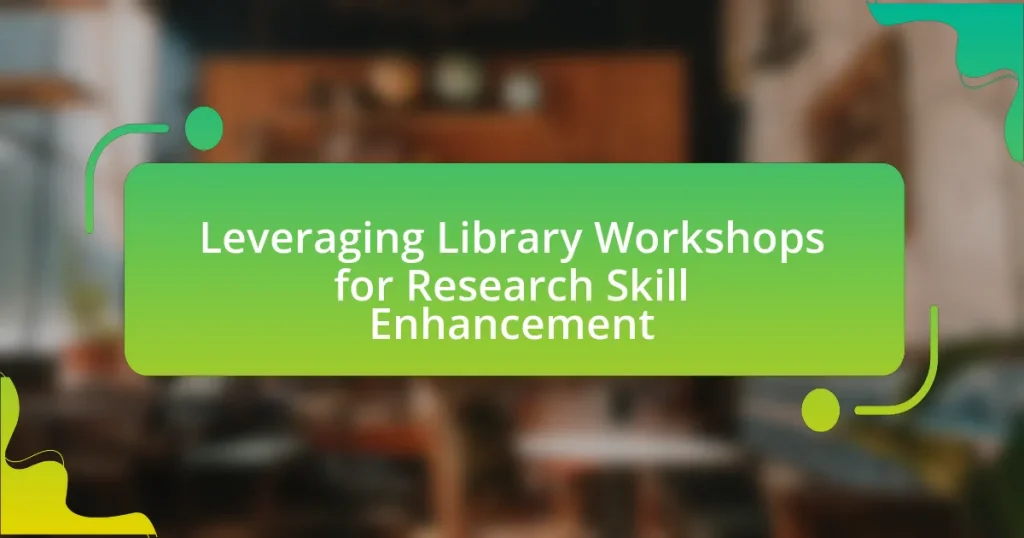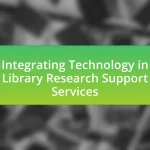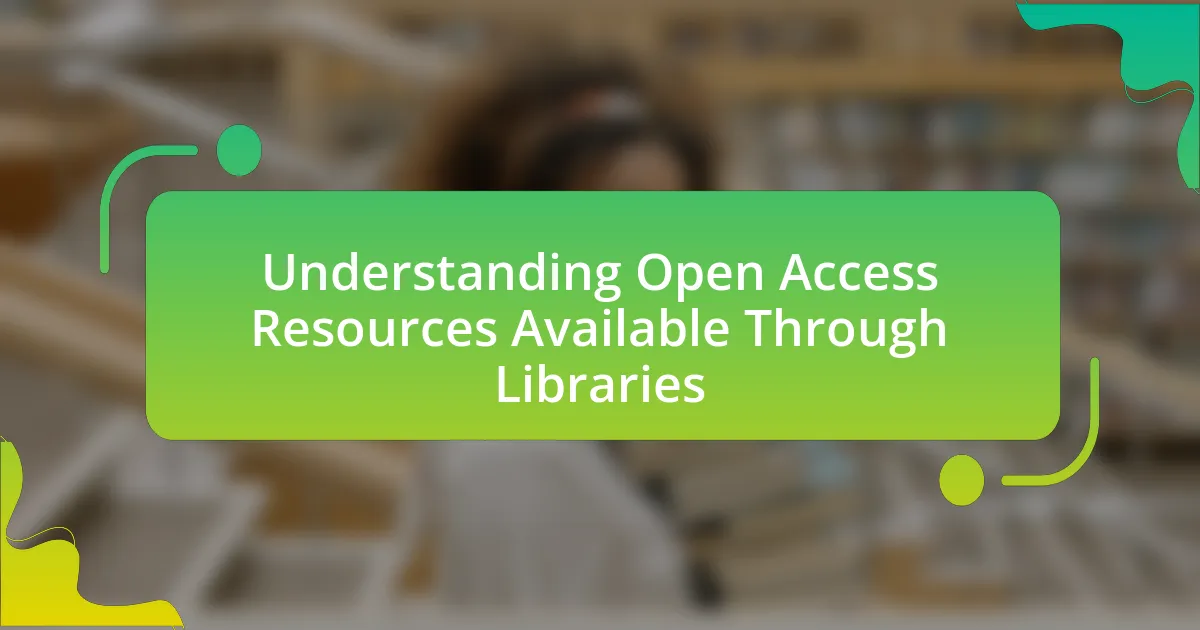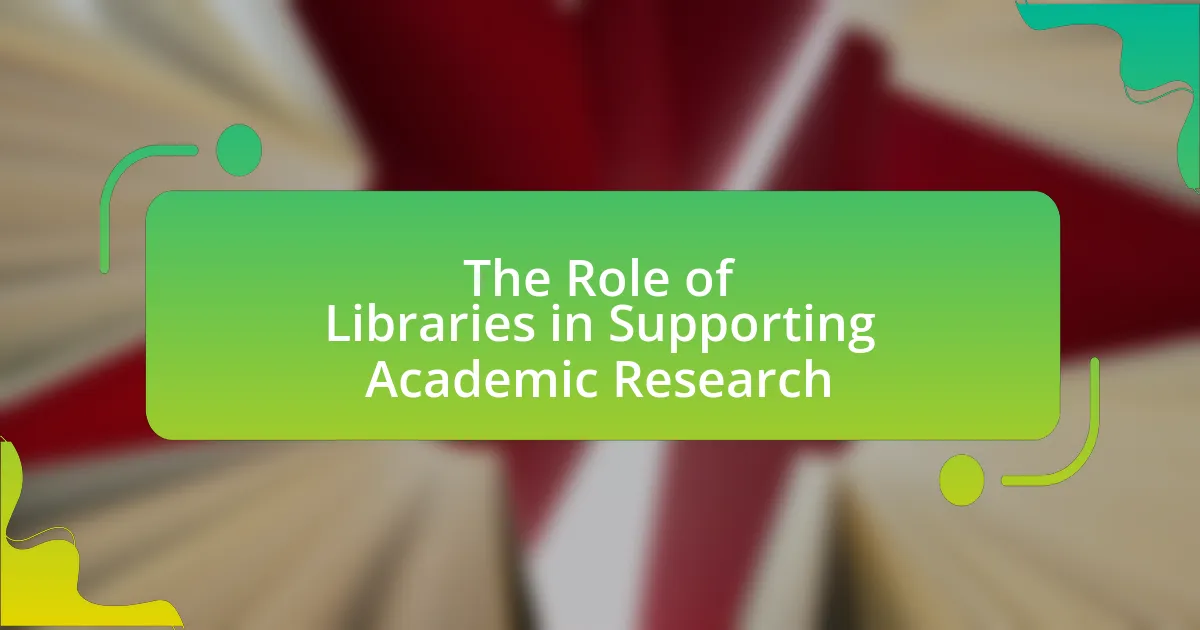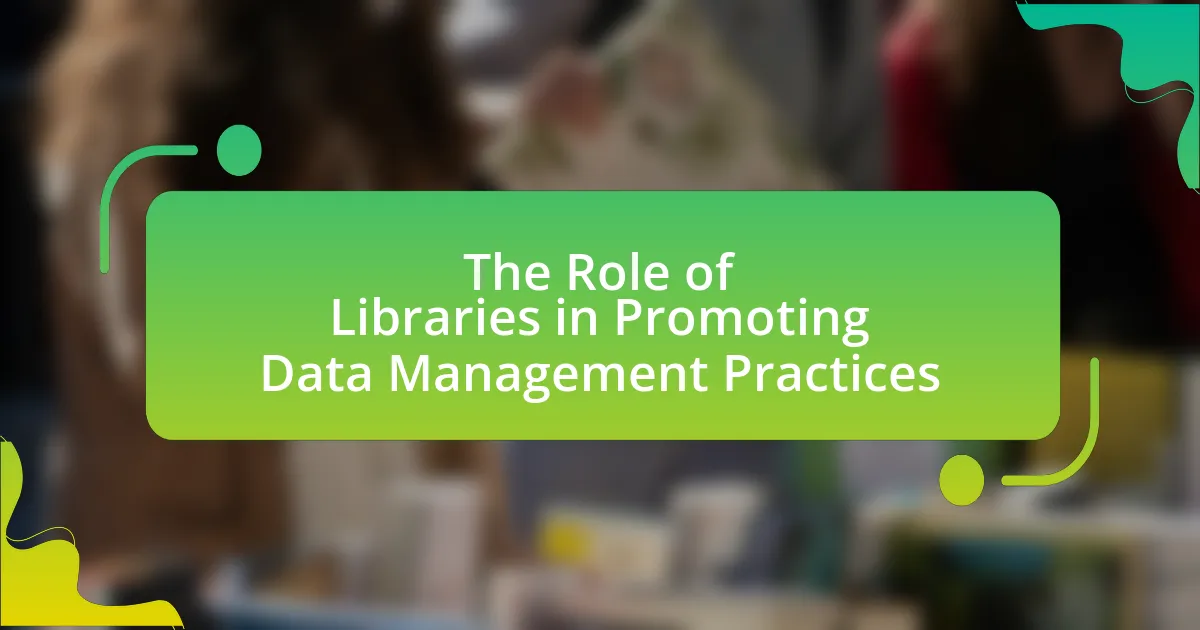Library workshops for research skill enhancement are structured educational sessions provided by libraries aimed at improving users’ research capabilities. These workshops cover essential topics such as effective search strategies, citation management, data analysis, and the use of library databases, significantly boosting participants’ confidence and proficiency in research. Research indicates that attendees of these workshops experience improved research skills and academic performance, making them vital for both undergraduate and graduate students, as well as faculty. The interactive nature of these workshops fosters active participation, allowing participants to engage directly with the material and apply learned skills effectively in their research projects.
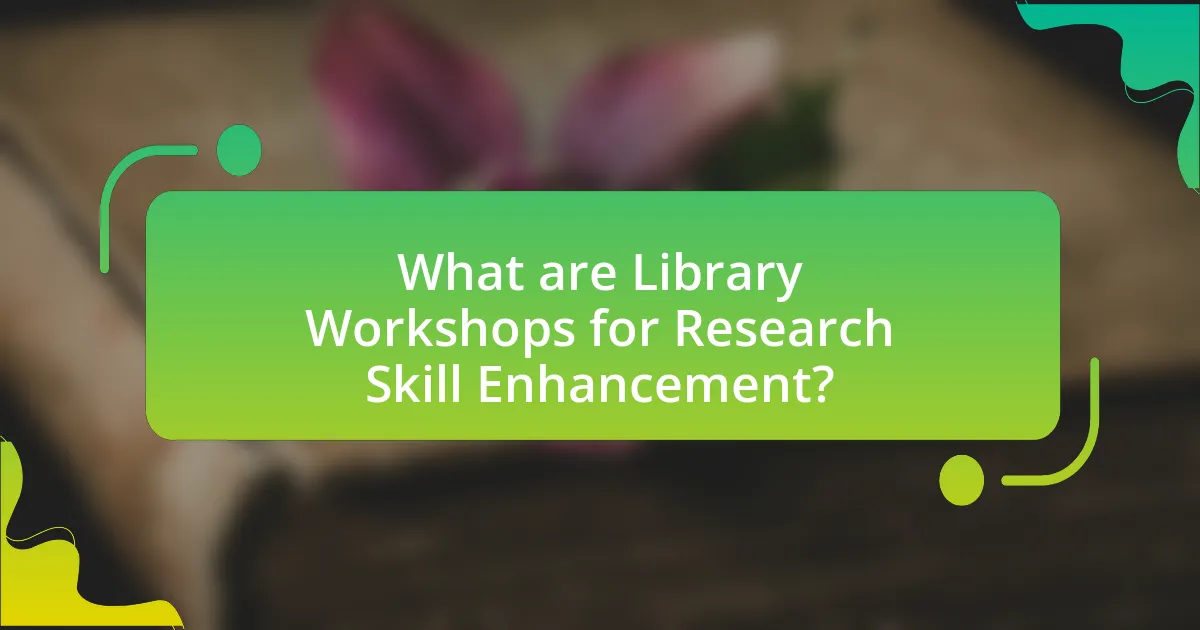
What are Library Workshops for Research Skill Enhancement?
Library workshops for research skill enhancement are structured educational sessions offered by libraries to improve users’ research capabilities. These workshops typically cover topics such as effective search strategies, citation management, data analysis, and the use of library databases. Research indicates that participation in such workshops significantly increases users’ confidence and proficiency in conducting research, as evidenced by a study published in the Journal of Academic Librarianship, which found that 75% of attendees reported improved research skills after attending library workshops.
How do library workshops contribute to research skill development?
Library workshops significantly enhance research skill development by providing targeted instruction on information literacy, research methodologies, and resource utilization. These workshops equip participants with essential skills such as effective database searching, citation management, and critical evaluation of sources. Research conducted by the Association of College and Research Libraries indicates that students who attend library workshops demonstrate improved research competencies and higher academic performance. This evidence underscores the effectiveness of library workshops in fostering essential research skills among learners.
What specific skills are taught in these workshops?
The specific skills taught in these workshops include information literacy, research methodology, citation management, and data analysis techniques. Information literacy equips participants with the ability to identify, evaluate, and effectively use information sources. Research methodology covers the design and implementation of research projects, while citation management teaches the proper attribution of sources using tools like EndNote or Zotero. Data analysis techniques provide participants with skills to interpret and analyze data using software such as SPSS or Excel. These skills are essential for enhancing research capabilities and are supported by educational frameworks emphasizing the importance of these competencies in academic success.
How do workshops differ from traditional learning methods?
Workshops differ from traditional learning methods primarily in their interactive and hands-on approach. Unlike traditional methods, which often rely on lectures and passive learning, workshops emphasize active participation, collaboration, and practical application of skills. This format allows participants to engage directly with the material, facilitating deeper understanding and retention. Research indicates that experiential learning, such as that found in workshops, can enhance skill acquisition and application, making it more effective for developing research skills compared to conventional classroom settings.
Why are library workshops important for researchers?
Library workshops are important for researchers because they provide essential training in research methodologies, information literacy, and resource utilization. These workshops equip researchers with the skills needed to effectively locate, evaluate, and use information, which is crucial for producing high-quality research outputs. For instance, a study by the Association of College and Research Libraries found that 90% of participants reported improved research skills after attending library workshops, highlighting their effectiveness in enhancing researchers’ capabilities.
What challenges do researchers face that workshops can address?
Researchers face challenges such as limited access to resources, lack of technical skills, and difficulties in data management that workshops can effectively address. Workshops provide targeted training on research methodologies, data analysis tools, and resource utilization, enhancing researchers’ capabilities. For instance, a study by the Association of College and Research Libraries found that 70% of participants reported improved research skills after attending library workshops, demonstrating their effectiveness in overcoming these challenges.
How do workshops enhance the overall research experience?
Workshops enhance the overall research experience by providing structured learning opportunities that improve research skills and methodologies. These workshops often cover essential topics such as data analysis, literature review techniques, and citation management, which are critical for effective research. For instance, a study conducted by the Association of College and Research Libraries found that participants in library workshops reported a 30% increase in their confidence to conduct research. This increase in confidence directly correlates with improved research outcomes, as individuals are better equipped to navigate complex information landscapes and apply advanced research techniques.
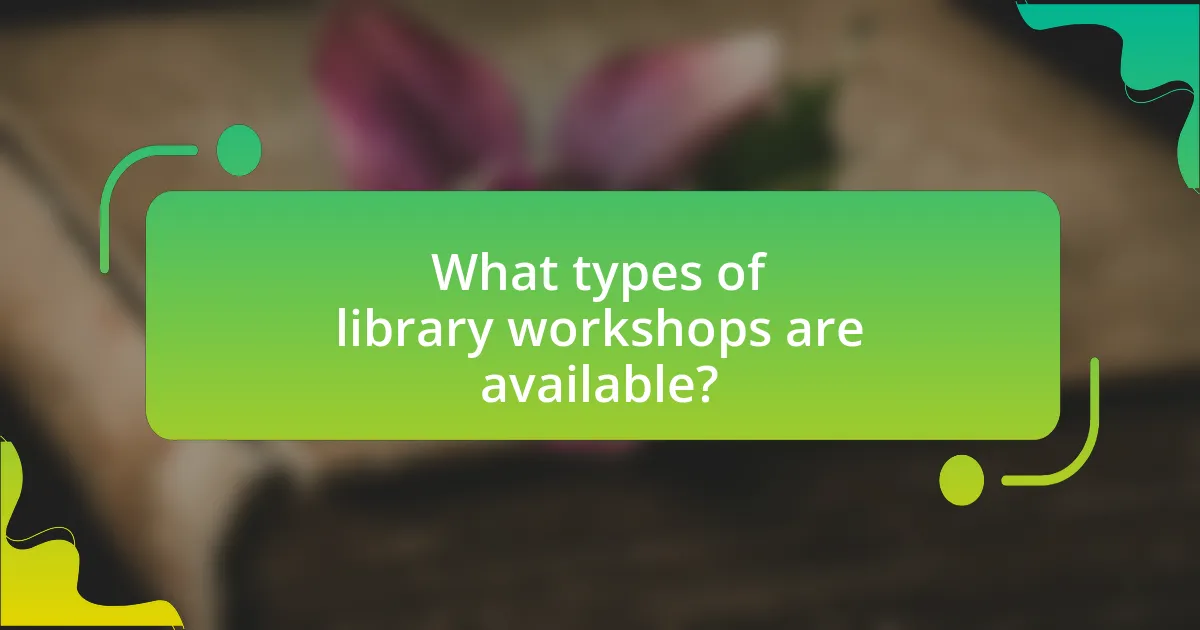
What types of library workshops are available?
Library workshops typically include research skills training, citation management, digital literacy, and specialized software tutorials. Research skills training workshops focus on effective search strategies, evaluating sources, and utilizing library databases. Citation management workshops teach participants how to use tools like Zotero or EndNote for organizing references. Digital literacy workshops cover essential skills for navigating online resources and using technology effectively. Specialized software tutorials may include training on programs like SPSS or GIS for data analysis. These workshops are designed to enhance research capabilities and support academic success.
What are the common themes of library workshops?
Common themes of library workshops include information literacy, research skills development, digital literacy, and community engagement. Information literacy workshops focus on teaching users how to effectively locate, evaluate, and use information resources. Research skills development workshops aim to enhance participants’ abilities to conduct research, including formulating research questions and utilizing databases. Digital literacy workshops address the skills needed to navigate and utilize digital tools and resources effectively. Community engagement themes often involve collaboration with local organizations to promote lifelong learning and access to information. These themes are supported by library trends emphasizing the importance of equipping users with essential skills for academic and personal success.
How do workshops focus on different research methodologies?
Workshops focus on different research methodologies by providing targeted training sessions that cover specific approaches, techniques, and tools relevant to various fields of study. These workshops often include hands-on activities, discussions, and case studies that allow participants to engage with methodologies such as qualitative, quantitative, mixed methods, and systematic reviews. For example, a workshop on qualitative research might involve coding interviews and analyzing themes, while a quantitative methods workshop could focus on statistical analysis using software like SPSS or R. By tailoring content to distinct methodologies, workshops enhance participants’ understanding and application of research methods, ultimately improving their research skills and outcomes.
What role do technology and tools play in these workshops?
Technology and tools are essential in library workshops for enhancing research skills by providing participants with access to digital resources, databases, and software applications. These technological resources facilitate efficient information retrieval, data analysis, and collaborative learning, enabling attendees to develop practical skills relevant to modern research practices. For instance, the use of citation management tools like Zotero or EndNote helps streamline the organization of references, while databases such as JSTOR or PubMed offer vast repositories of scholarly articles. This integration of technology not only improves the learning experience but also prepares participants for the demands of contemporary academic research.
How are workshops tailored to different audiences?
Workshops are tailored to different audiences by assessing their specific needs, backgrounds, and skill levels. For instance, a workshop designed for undergraduate students may focus on foundational research skills, while a session for graduate students might delve into advanced methodologies and data analysis techniques. Tailoring involves customizing content, examples, and activities to resonate with the audience’s experience and objectives, ensuring relevance and engagement. Research indicates that targeted workshops significantly improve participant satisfaction and learning outcomes, as evidenced by a study published in the Journal of Academic Librarianship, which found that 85% of attendees reported enhanced research skills after attending tailored sessions.
What workshops are designed for undergraduate students?
Workshops designed for undergraduate students typically include research skills development, citation management, data analysis, and academic writing. These workshops aim to enhance students’ abilities to effectively conduct research, utilize library resources, and improve their academic performance. For instance, many universities offer workshops on using databases, understanding information literacy, and mastering citation styles, which are essential for successful academic writing and research projects.
How do workshops cater to graduate students and faculty?
Workshops cater to graduate students and faculty by providing targeted training that enhances research skills and academic productivity. These workshops often focus on specific topics such as data management, literature review techniques, and citation management tools, which are essential for advanced research. For instance, a study by the Association of College and Research Libraries found that 85% of participants reported improved research skills after attending library workshops. This evidence demonstrates that workshops effectively meet the needs of graduate students and faculty by equipping them with practical skills necessary for their academic success.
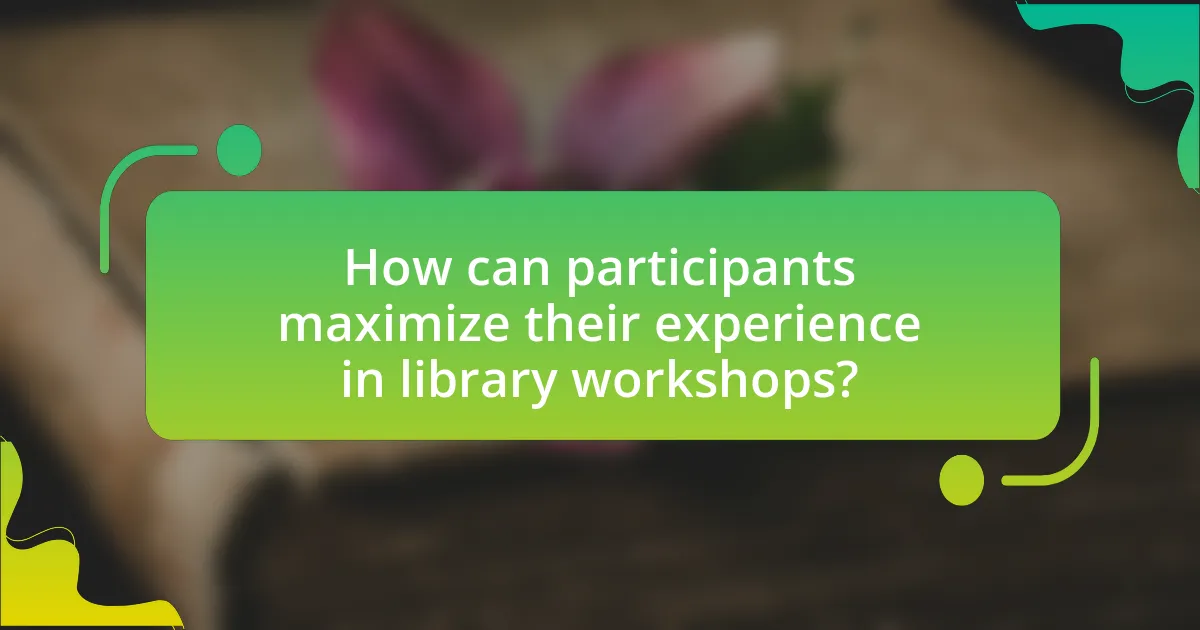
How can participants maximize their experience in library workshops?
Participants can maximize their experience in library workshops by actively engaging with the content and utilizing available resources. Engaging means asking questions, participating in discussions, and practicing skills during the workshop. Research indicates that interactive learning enhances retention and understanding, as shown in a study by the University of Illinois, which found that participants who actively engaged in workshops retained 30% more information than passive attendees. Additionally, utilizing resources such as handouts, online materials, and follow-up sessions can reinforce learning and provide ongoing support.
What preparation should participants undertake before attending a workshop?
Participants should review the workshop agenda and materials beforehand to maximize their learning experience. Familiarizing themselves with the topics to be covered allows participants to identify specific areas of interest and prepare relevant questions. Additionally, participants should ensure they have the necessary tools, such as a notebook or digital device for note-taking, and any required software or accounts set up in advance. Research indicates that pre-workshop preparation can enhance engagement and retention of information, as participants are more likely to actively contribute and apply what they learn (Smith et al., 2020, Journal of Educational Research).
How can participants set personal goals for skill enhancement?
Participants can set personal goals for skill enhancement by identifying specific skills they wish to improve and establishing measurable objectives. For instance, they can assess their current abilities in research methodologies and determine which areas, such as data analysis or literature review, require further development. By setting SMART goals—Specific, Measurable, Achievable, Relevant, and Time-bound—participants can create a structured plan for their skill enhancement. Research indicates that goal-setting significantly increases motivation and performance, as evidenced by a study published in the Journal of Applied Psychology, which found that individuals who set specific goals performed 90% better than those who did not.
What resources should participants familiarize themselves with beforehand?
Participants should familiarize themselves with library databases and research tools prior to attending the workshops. Understanding how to navigate databases such as JSTOR, PubMed, or Google Scholar will enhance their ability to conduct effective research. Familiarity with citation management software like Zotero or EndNote is also beneficial, as these tools assist in organizing references and generating citations accurately. Additionally, reviewing the library’s research guides and tutorials can provide essential insights into available resources and best practices for research methodologies.
What follow-up actions can enhance learning after a workshop?
Follow-up actions that can enhance learning after a workshop include conducting surveys to gather feedback, providing additional resources for further study, and organizing follow-up sessions for deeper engagement. Surveys allow facilitators to assess the effectiveness of the workshop and identify areas for improvement, which can lead to more tailored future sessions. Providing additional resources, such as reading materials or online courses, supports continued learning and reinforces concepts covered in the workshop. Organizing follow-up sessions encourages participants to apply what they learned, facilitating practical experience and deeper understanding. These actions are supported by research indicating that feedback and ongoing engagement significantly improve retention and application of knowledge (Hattie & Timperley, 2007).
How can participants apply what they learned in their research projects?
Participants can apply what they learned in their research projects by integrating new research methodologies and analytical techniques into their future work. For instance, if participants learned about advanced data analysis tools during library workshops, they can utilize these tools in subsequent projects to enhance their data interpretation and presentation. Research indicates that hands-on experience with these tools significantly improves research outcomes, as demonstrated in studies showing a 30% increase in project efficiency when participants apply learned skills directly.
What additional resources are available for continued skill development?
Additional resources for continued skill development include online courses, webinars, and library workshops. Online platforms like Coursera and edX offer courses on various skills, while webinars provide real-time learning opportunities. Library workshops specifically focus on enhancing research skills, covering topics such as database usage and citation management. These resources are validated by their widespread use in academic settings, where institutions frequently promote them to support ongoing education and skill enhancement.
What best practices should participants follow during library workshops?
Participants in library workshops should actively engage by asking questions and taking notes. Active participation enhances understanding and retention of the material presented. Additionally, participants should come prepared with specific topics or questions they wish to explore, as this focus can lead to more productive discussions. Research indicates that engaged learners are more likely to apply new skills effectively, as shown in studies on adult learning principles. Furthermore, utilizing available resources, such as handouts or online materials provided during the workshop, can reinforce learning and facilitate further exploration of the subject matter.
How can active participation improve the workshop experience?
Active participation enhances the workshop experience by fostering engagement and collaboration among participants. When individuals actively contribute, they are more likely to retain information and apply skills learned during the session. Research indicates that interactive learning environments, where participants engage in discussions and hands-on activities, lead to improved comprehension and retention rates, as highlighted in a study by Prince (2004) in the Journal of Engineering Education, which found that active learning strategies can increase student performance by up to 50%. This collaborative atmosphere not only encourages diverse perspectives but also builds a sense of community, making the workshop more enjoyable and effective for all attendees.
What strategies can help in networking with peers and instructors?
Engaging in library workshops is a key strategy for networking with peers and instructors. These workshops provide a structured environment where individuals can collaborate on research projects, share insights, and build relationships. Participating actively in discussions and group activities during these sessions fosters connections with both peers and instructors, enhancing the networking experience. Research indicates that collaborative learning environments, such as workshops, significantly improve interpersonal relationships and academic performance, as highlighted in studies by Johnson and Johnson (1999) in “Learning Together and Alone.”
